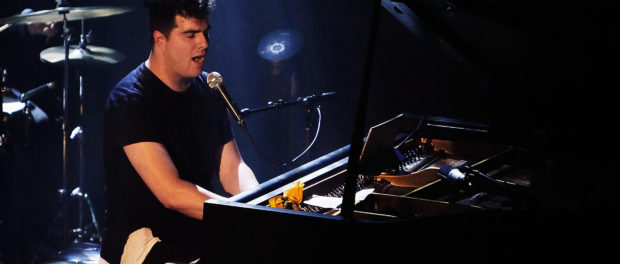Jeremy Dutcher: the music of activism
 By Artsandstuff1 - I took the photo at Jeremy's concertPreviously published: Christina Cassaro, CC BY-SA 4.0, https://commons.wikimedia.org/w/index.php?curid=72720322
By Artsandstuff1 - I took the photo at Jeremy's concertPreviously published: Christina Cassaro, CC BY-SA 4.0, https://commons.wikimedia.org/w/index.php?curid=72720322
If you don’t already know Jeremy Dutcher, you should. A member of Tobique First Nation in New Brunswick, this classically trained singer, composer, musicologist, and activist won the Polaris prize in 2018, and a Juno for Indigenous Music Album of the Year this year. While studying classical voice in Halifax, Dutcher spent time in the archives at the Canadian Museum of History, transcribing Wolastoq songs recorded in 1907 on wax cylinders. The way he integrates these historical recordings into his live performances is profoundly moving. Indeed, his performance at Club Soda Wednesday night managed to combine supreme artistry, political activism, profound emotion, and great fun in a uniquely Canadian way.
With fewer than 100 Wolastoqey speakers left, Dutcher believes in the importance of keeping the language alive and passing it down to the next generation: “If you lose the language, you’re not just losing words; you’re losing an entire way of seeing and experiencing the world from a distinctly indigenous perspective.” All but one of the songs he performed were sung in Wolastoq; one he performed in English because, as he said, it was important to him to communicate directly to everyone in the audience. That song was about Missing and Murdered indigenous Women.
But even if most of the audience couldn’t understand the lyrics of most of the songs, their emotional and historical impact came through loud and clear. Dutcher was onstage with two other musicians: Montreal native Blanche Israel on cello, and Torontonian Gregory Harrison on percussion. Dutcher himself spent most of the evening at the piano, where he also controlled what he called his “ancestor player.” Most songs featured the recorded voices of his elders and ancestors, over which Dutcher has built impressive and moving pieces that incorporate his classical voice and piano training along with gorgeous atmospheric lines and rhythms from the cello and percussion. The net result is something uncategorizable: not quite classical, not quite pop, not quite jazz, something unique and moving and important.
Dutcher’s artistry can’t be separated from his political voice. His ability to talk about indigenous issues—the mismatch between Trudeau’s words and actions on issues of reconciliation, justice, and accountability; missing and murdered indigenous women; the importance of keeping indigenous cultures alive—while maintaining a sense of optimism, awe, and joy: this is what carries both his music and his activism, and it’s something that every Canadian should experience, and help transmit to the rest of the world.
Jeremy Dutcher played Club Soda July 3 2019.




